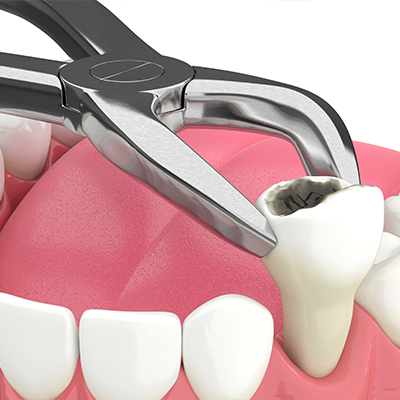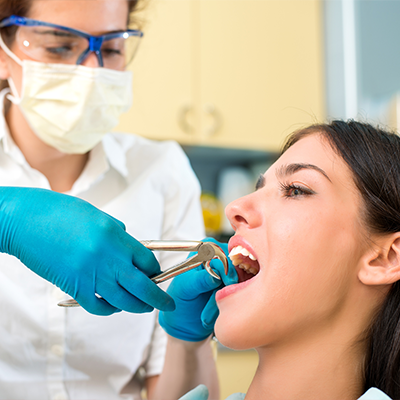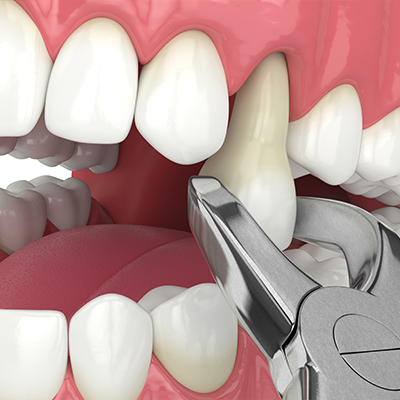Menu
- New Patients:
- (727) 304-1673
- Current patients:
- (727) 334-7990
Menu
Your teeth should last a lifetime with proper care and maintenance. However, this may not always be the case. In some cases, for a variety of different reasons, a tooth may need to be extracted. Here is what you need to know about tooth extraction at Baker Family and Cosmetic Dentist in Clearwater.
Dr. Craig Baker at Baker Family and Cosmetic Dentist in Clearwater strives to create a patient-friendly environment. He has the experience and expertise to treat a variety of dental health conditions in pediatric patients as well as the elderly.


The cost of tooth extraction varies, depending on the type of extraction.
The average cost of wisdom tooth extraction ranges from around $200 to $1,100 based on the complexity of the extraction. A tooth that is fully erupted costs less than one that is impacted.
Three types of tooth extractions are commonly carried out by a dental professional. There are specific reasons for each one and patients must meet specific criteria before a particular one will be recommended.
A simple extraction is recommended when the tooth is visible. The dentist has instruments that can be used to loosen the tooth from the jawbone. Typically, this procedure is done under local anesthesia, and OTC pain relievers are often recommended to control any post-procedure pain.

Surgical extraction is recommended when the affected tooth is still under the surface of the gums or is not easily accessible. Typically, the dentist must make an incision in the gum to access the tooth. This is much more complex than a simple tooth extraction. In many cases, since this is a surgical procedure, general anesthesia is used, and patients often need prescription pain relievers to relieve post-surgical pain.
While wisdom tooth extraction falls under the category of surgical extraction, it is such a common procedure that it is listed in a category of its own. Wisdom teeth do not serve a practical purpose and can be painful if they grow in at the wrong angle. Therefore, it is recommended that they be removed to avoid potential problems. The procedure itself is a fairly easy one and pain can usually be treated with OTC pain relievers.

While your permanent teeth should last a lifetime with proper care and maintenance, this may not always be the case. Sometimes, teeth become damaged and/or decayed and must be removed. Some of the most common reasons for tooth extraction include:
Sometimes, the dentist may recommend tooth extraction to create space for orthodontic treatment. The purpose of orthodontics is to bring teeth into proper alignment, which may not be possible if teeth are too crowded or too big for your mouth.
Typically, if an infection gets into the center, or pulp, of the tooth, root canal treatment will be recommended. However, this procedure is not always successful. If this is the case, extraction becomes the only option. This will stop the spread of the infection, which can be life-threatening.
If you are undergoing chemo or on the organ transplant list, your immune system may be compromised. This means that your body can’t naturally fight a tooth infection and an extraction may be recommended to reduce the risk of it spreading.
If you have periodontal disease that has spread to the point of causing teeth to loosen within the gums, you may need a tooth extraction. (1)
There are several steps involved in the tooth extraction procedure at Baker Family and Cosmetic Dentistry of Clearwater:
Whenever possible, it’s best to salvage the natural teeth. Therefore, the first step to any procedure at Baker Family and Cosmetic Dentistry of Clearwater is the initial consultation. During this visit, Dr. Baker will perform a comprehensive exam, which often includes X-rays and other necessary imaging. He will also discuss your current oral/medical condition as well as your history. This will determine if extraction is the best option or if something else can be done to salvage the natural tooth.

The dentist will start by administering local anesthesia to the area around the affected tooth. This will help to block any pain or discomfort during the procedure. Typically, local anesthesia is enough. However, some patients need more.
If necessary, oral or IV sedation or general anesthesia will be administered. This will help the patient fully relax during the procedure.
Special instruments are used to gently loosen the tooth from its socket. In the case of surgical extraction, incisions will be made in the gum to allow the dentist to access the tooth. This is often necessary if a tooth is impacted or is badly decayed and has broken off at the gum line.
After the tooth is removed, the socket will be cleaned and disinfected. Sometimes the dentist may do a dental bone graft to fill in the hole left behind by the extracted tooth. This will prevent jawbone loss. Stitches will be put in to close the extraction site.
After the tooth has been removed, the dentist will place a piece of gauze over the extraction site and have you bite down. This will help to absorb the blood and also encourage the formation of a blood clot. You should change the gauze out every 30 minutes or when it gets soaked with blood. Once the bleeding slows, you can take it out, though you may continue to have light bleeding through the first 24 hours.

Aftercare following tooth extraction varies slightly depending on a few different factors including the location of the tooth and complexity of the tooth root system. However, as a general rule, pain decreases after about 3 days. The most important part of aftercare is making sure that the blood clot stays in place to avoid a painful complication known as a dry socket.
Most of the aftercare 24 to 48 hours following extraction is focused on allowing the blood clot to form. Light bleeding for up to 24 hours is normal- but active bleeding after this point should be evaluated by the dentist. For the first 48 hours, you should:
Healing should be complete within 10 days- but this does depend a lot on the patient’s age and their body’s ability to heal as well as habits such as smoking. However, if you are still experiencing discomfort or other problems, you may want to continue following the above aftercare tips.
If you have any of the following symptoms, you should contact right away for emergency dentist treatment, as these indicate serious complications:
If you have a tooth that you think may need to be extracted, schedule your consultation with Dr. Baker at Baker Family and Cosmetic Dentistry of Clearwater. Dr. Baker will examine your mouth to determine if another procedure can salvage the tooth or if extraction is best. If the tooth must be extracted, you may need to consider tooth replacement options as well.
In addition, minimize or avoid contact with foods/beverages and other factors that can contribute to discoloration.
If you have any questions or concerns about tooth extraction, Dr. Baker and the team at Baker Family and Cosmetic Dentistry will be happy to address them. Below are some of the most common questions that we get.
If you do not have dental insurance, a simple tooth extraction can be as little as $75, while a surgical extraction, especially a wisdom tooth, can usually start at around $300.
You should avoid oral hygiene for the first 24 hours following a tooth extraction- but once the clot has set, you can brush and floss as usual. However, make sure that you are gentle with the extraction site.
You should wait until the anesthesia wears off before you eat anything following tooth extraction. If you try to eat before, you risk injury to your tongue, cheek, or lips. When you do eat, stick to soft foods at first and avoid chewing on the side of the extraction.
Ice cream is soft and cold, which makes it a great food to eat after tooth extraction.
The primary reason that wisdom tooth removal is so expensive is that it is a surgical procedure that requires an oral surgeon. Also, since it is a surgical procedure, general anesthesia is typically used which requires the presence of an anesthesiologist.
The cost of anesthesia is usually billed in 15-minute to hour increments, with the average cost being $50 to $200. Therefore, the cost of anesthesia depends on how long it takes for the tooth or teeth to be removed.
By appointment